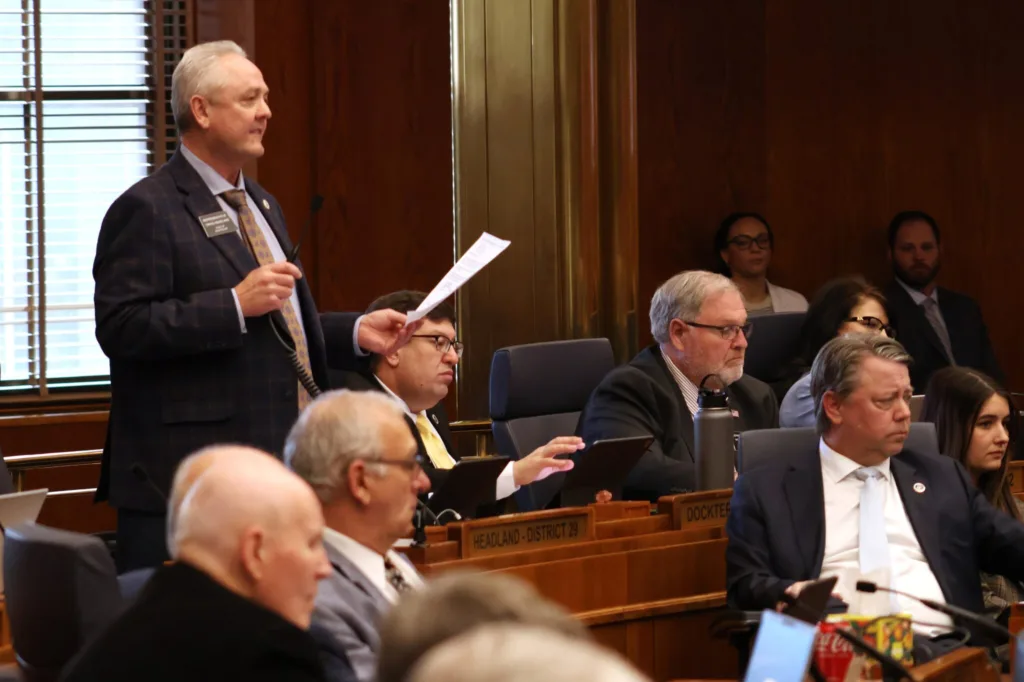

By: Michael Achterling and Amy Dalrymple (North Dakota Monitor)
The North Dakota House and Senate compromised on a property tax package Friday, acting on one of the Legislature’s top priorities hours before the session wrapped up early Saturday.
The property tax bill creates a $1,600 primary residence credit, more than triple the amount homeowners receive now.
But one House member said he plans to promote an initiated measure for the November 2026 ballot that would aim to cut taxes for other property types.
House Bill 1176, sponsored by Rep. Mike Nathe, R-Bismarck, and backed by Gov. Kelly Armstrong, passed with a unanimous vote in the Senate and 86-4 vote in the House.
Lawmakers identified property tax reform as a top priority for the session after voters initiated a ballot measure last year that sought to eliminate property taxes based on assessed value. Although the measure failed, lawmakers said they heard from voters that they expect property tax cuts in the future.
The bill uses earnings from the state Legacy Fund to pay for the program, with the idea that lawmakers could consider even greater property tax relief in the future as the fund grows. Armstrong’s vision is that eventually most homeowners would be on a path to paying zero property taxes.
“This bill provides real relief and real reform for taxpayers,” Armstrong said in a statement Friday. “It’s responsible, affordable and durable. It creates Legacy Fund buy-in, and it’s the single most impactful thing we could do for North Dakota citizens this session.”
The legislation also seeks to slow the growth of property tax increases with a 3% cap on how much local governments can increase the taxes annually.
The total amount of property tax relief in the package is estimated at $473 million for 2025-27, Tax Commissioner Brian Kroshus said. The bill also includes more money for a disabled veterans tax credit and a renters refund.
“This is truly a landmark bill when it comes to property taxes,” Nathe said after the conference committee agreed on a final version of the bill. “Probably historic.”
Donnell Preskey, government and public affairs specialist for the North Dakota Association of Counties, said counties were not in favor of the caps, but the bill includes an opt-out provision that would allow residents in a taxing district to vote to be exempted from the caps for four years.
“That’s one of the elements we worked really hard to get in there,” Preskey said. She added there are still concerns about what local budgets will look like with 3% caps over the next two years.
She said the association hopes to educate counties on the new property tax rules, how it will impact their budgets and some of the flexibility options available.
The bill also caps how much school districts can raise property taxes. It contains a provision that if the cap on schools forces some districts to drop below the state-mandated local education contribution level, the Department of Public Instruction would administer gap funding to make the districts whole. An additional $30 million is set aside for that gap funding.
Lawmakers removed a so-called “skin-in-the-game” provision the Senate advanced that would have required homeowners to pay at least 25% of their property tax bill. The Legislature defeated two other property tax proposals that also would have benefited owners of agricultural land, commercial property and centrally assessed properties.
Rep. Scott Louser, R-Minot, sponsored House Bill 1168, a competing property tax bill that would have had the state pay 100% of public school funding as a way to deliver property tax relief. Louser said he plans to advance that proposal through an initiated measure. He said he plans to gather signatures with the goal of getting it on the November ballot.
“I was taught to always fight for what I believe in and, members of the assembly, this may be something you believe in, too,” Louser said.
Rep. Craig Headland, R-Montpelier, chairman of the House Finance and Taxation Committee, expressed frustration with the potential ballot measure.
“For a legislator to come on and talk about how he’s going to lead a petition because he doesn’t like the outcome of the property tax relief that the majority of the assembly decided was the way to go is a bit over the top,” Headland said.
North Dakota motorists won’t see an increase in the gas tax.
Members of the House previously advanced a 5-cent increase to the motor fuels tax to support maintenance of roads and bridges. It would have been North Dakota’s first gas tax increase in 20 years.
But the Senate unanimously defeated a separate proposal with a 3-cent gas tax increase. Opponents to raising the gas tax said it didn’t make sense to reduce property taxes for citizens while at the same time raising another tax.
In a compromise, the Legislature removed the gas tax increase from the Department of Transportation budget that was approved Friday.